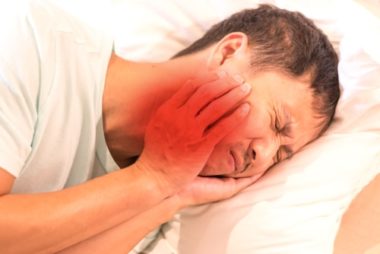Do you often wake up in the morning with a deep jaw pain? Are your teeth becoming increasingly more sensitive? If these conditions relate to you, you should consider talking to a dentist about nightguards. A night guard is a plastic retainer that covers your teeth at night while sleeping. This prevents damage that could be done to your jaw and mouth by grinding your teeth or clenching your jaw uncontrollably when you sleep. This is a very common issue that people deal with. In fact, approximately 30 to 40 million people are approximated to grind their teeth overnight.
If left untreated, this condition can lead to significant pain, tooth decay, and even a misaligned bite or teeth. In order to ensure you do not suffer from any lasting conditions, wearing a night guard can significantly help. Let’s look at reasons people need nightguards, as well as how they can help, below.
Signs You May Benefit from Nightguards
A night guard should be used when teeth grinding is apparent. There are plenty of signs that show if you’d benefit from wearing a night guard when sleeping or not. The most tell-tale sign that dentists look for when seeing if suitable for a night guard is if you wake up with jaw pain consistently. Because of the bite force and pressure people exert when grinding their teeth, this could easily lead to jaw pain in the morning. If you have this, in combination with sensitive or worn-down teeth, a night guard will help you.
Tooth decay and sensitivity can be caused by grinding because enamel is soft and can break down if too much pressure is exerted on it. Wearing down the protective layer of your teeth can be damaging and lead to more significant issues in the future.
Other less obvious signs that shows a night guard may be best for you is if you wake up with migraines or headaches. Similar to above, putting pressure on your jaw can lead to headaches and pain as well. If you’re consistently experiencing this symptom, it may help to visit a dentist to get fitted for a mouth guard. Anxiety can also lead to teeth grinding, so if you’re experiencing this, talk to a dentist today. During a dentist appointment, your dentist can observe how your teeth and jaw look to determine if a night guard is a good option for you.
What Nightguards Can Prevent
If you are experiencing the aches and pains from grinding your teeth, it is important you get fitted for a night guard. Doing so will extend the longevity of your teeth and oral condition. Some things that wearing a night guard can successfully prevent include the wearing of teeth, any tooth sensitivity or pain, and if you have any chipped or cracking teeth. More specifically, nightguards are plastic which have a slippery surface.
When rubbed together, the top and bottom glide past another. This prevents your upper and lower teeth from coming into contact with each other, ultimately saving them from grinding down. When your teeth meet and grind, they can break down the protective layers and cause extreme sensitivity and pain in severe cases. If you suspect you may be grinding your teeth, it is vital you speak with your dentist to discuss potential options of nightguards as soon as possible.
Get Fitted for Nightguards
Getting nightguards could easily save your jaw and teeth from unnecessary pain and discomfort. Your dentist is able to see any tenderness or tooth decay uncommon with regular wear, allowing them to determine if a night guard would be best for you. Be sure to discuss your concerns with them in order to accurately express yourself and your pains.
Don’t suffer from headaches, jaw pain, or tooth sensitivity. Contact us to get fitted for custom nightguards at Inglewood Family Dental today!


